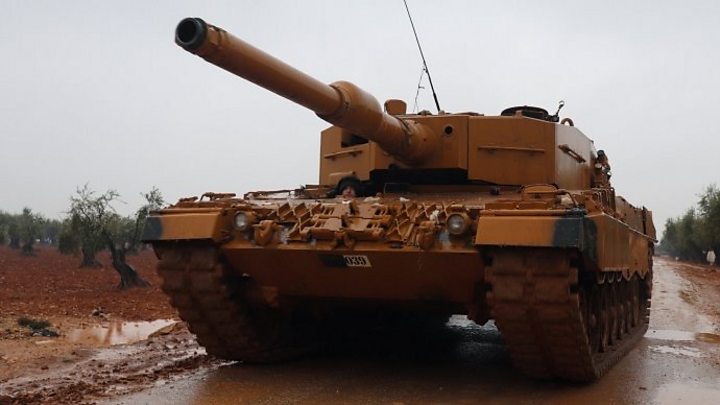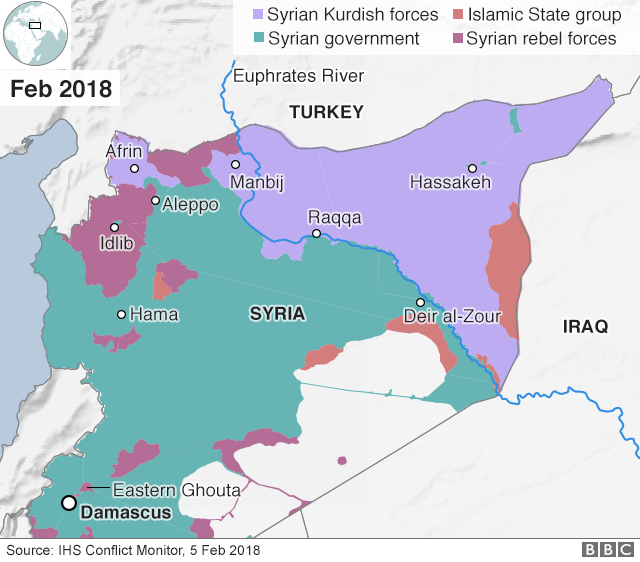United States coup accuser is punching above his weight. A diminutive mule, ERDOGAN, is waging a verbal war against the United States and is gearing up in the trenches for the ultimate fight against Israel. What has to happen here is two-fold, one being to throw the Russia confidant out of NATO and bring to bear all of the economic weight we can against this Muslim Brotherhood bed mate. Turkey is in a predicament, the economy is in a tailspin, their currency cratering by the minute. Turkey is in big trouble today, but it will only get worse. Remember Turkey is now entering the age of an autocrat taking exclusive power of all levers of government; the legislative and judiciary, not counting the military which has been rationalized since the coup.
What is most important here is Turkey’s stance with Russia, as far as we can tell, Erdogan went to his knees begging for Russia’s help in countering the Kurds in Syria’s Afrin fight.
So why did Russia open the air space to Turkey for the Afrin operation? What does Russia aim to achieve by helping Turkey in this we?
I have come up with the following observations while seeking answers to these questions.
1) It suits Russia’s interests
Russia’s move is in line with the direction that Turkey-Russia relations have recently taken. Russia has considerable economic, political and regional interests in Turkey. By siding with Turkey in Afrin, Russia has actually done what is necessary to protect its interests. On the one hand there are Russia’s interests in Turkey and on the other hand there are its relations with the Syrian Kurds. Obviously the former outweighs the latter. Moscow also probably calculates that the gestures it extends to Ankara help it gain an upper hand and serve as a bargaining chip vis-à-vis Turkey. Indeed, there is no doubt that such gestures will boost the perception of Russia in the eyes of the Turkish public.
2) It shows that Russia is a playmaker
Russia has been an active party in the war in Syria since 2015, supporting Bashar al-Assad with its military power against opposition groups. The steps that Russia has taken towards Turkey will help to bolster its main strategy of strengthening the Syrian regime. Once again, Russia has asserted itself as the main playmaker in Syria. It has shown that all roads lead to Moscow and has prepared the ground for its political strategy of achieving a permanent Russian presence in the Middle East. This, in return, will help Russian President Vladimir Putin achieve his aim of making Russia a powerful global player again.
3) Russia wants Turkey on its side
Russia is also taking into account the possible benefits of maintaining close relations with Turkey because it is a key player in the region. At a time when Syria’s fate is being decided, Russia has taken initiatives – such as the recent peace conference in Sochi – to bring about solutions of its own choosing while maintaining close dialogue and cooperation with Turkey. All of this will give Moscow the upper hand at the table.
4) Turkey is drifting away from the United States
One cannot assume that Russia’s move is not a part of its policy against the U.S. The deepening of disagreements between Ankara and Washington, which has led to serious fissures within NATO, does not upset Russia at all. By facilitating the launch of the Afrinoffensive, which Russia knows the U.S. would be uneasy with, Russia has caused Turkey and the U.S. to drift further away from each other. From Moscow’s point of view, Turkey’s drifting away from the West will bring it within the orbit of Russia.
5) It curbs the U.S.’s Kurdish plan
At the same time, Moscow is trying to curb the U.S.’s plans to establish a permanent American presence in northern Syria and to create an area under its influence that could eventually lead to the emergence of a state. In doing so, Russia is showing the Kurds that cooperating with the U.S. in Syria comes at a price. If the Kurds do not get enough support from the U.S. in the face of the Turkish military operation in Afrin, problems could arise between Washington and the Syrian Kurds. This would also help Russia achieve its geopolitical goals.
6) Russia is trying to mediate between Ankara and Damascus
As a result of Turkey’s operation against the Syrian Kurdish Democratic Union Party (PYD), Turkey has made indirect contact with the al-Assad regime in Damascus. The fact that both sides have troops on the ground necessitates keeping communication channels open, at least to prevent any mishap. We can imagine that out of this necessity, Russia wants to help Turkey and Syria mend ties. Russia might try to strengthen the Syrian regime by helping Turkey and Syria normalize their relations through dialogue.
7) It eases the hand of the al-Assad regime in Idlib
The Free Syrian Army’s (FSA) engagement with the PYD in Afrin has another indirect consequence. The regime in Damascus will find it much easier to act in its plans for Idlib, which is currently held by opposition groups. At a time when the international community’s attention has turned to Turkey’s military operation in Afrin, al-Assad will feel less international pressure as he makes gains around Idlib.








